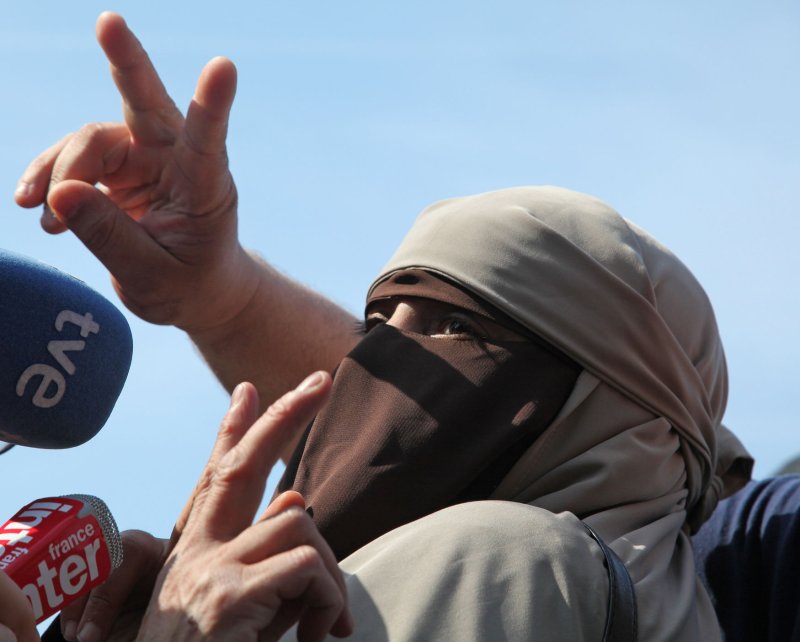A woman wears a burqa (full-face veil) in front of Notre Dame Cathedral in defiance of a new French law banning the garment in Paris on April 11, 2011. The controversial new law takes effect today and officially bans all garments which cover the face. Violators are subject to a fine of 150 euros ($217). UPI/David Silpa |
License Photo
PARIS, April 11 (UPI) -- France's controversial burqa ban came into force Monday, with women wearing the Muslim face veil in public risking fines of $200 and classes on secularism.
The controversial law, the first of its kind in Europe, also foresees fines of up to $90,000 and two years in jail for anyone found to have forced a woman to conceal her face, Radio Free Europe reports.
France, a country of 62 million inhabitants, is home to Europe's largest Muslim population, estimated at 6 million. The French government says the ban will affect around 2,000 women, but many more Muslims say they feel stigmatized by the new law.
French President Nicolas Sarkozy, whose government had pushed the law, says it's necessary to guarantee security, uphold France's secular ideals and protect women from suppression.
Critics, however, have accused Sarkozy of trying to regain voter support with a populist move. His popularity ratings are at a record low ahead of next year's presidential election, and the far-right National Front, led by Marie Le Pen, is seen as a potential rival for voters disgruntled with Sarkozy's leadership. Last year, Sarkozy came under fire for deporting Roma Gypsies, another move critics said was aimed at winning back lost electoral support.
Human rights groups have attacked the burqa ban as discriminatory.
Amnesty International said in a statement ahead of last year's parliamentary vote on the ban that it "violates the right to liberty of expression and religion of those women" who wear veils "as an expression of their identity or their convictions."
Even those women who don't wear the full-face veil out of free will could suffer, critics say. Their husbands or fathers may simply forbid them to leave the house, further curtailing their chances of taking part in French daily life, Amnesty International warned.
"Governments should instead be looking to strengthen efforts to combat the discrimination faced by Muslim women, both in their communities and in the broader societies in which they live," AI said. "Their focus should be on empowering women to make their own choices, rather than limiting the range of choices available to them."
In neighboring Belgium, lawmakers approved a similar ban, but the political crisis (the country has been without a government for months) has derailed its enforcement. In Netherlands and in Italy, far-right politicians have called for similar laws. The proposals have sparked debate about religious freedom in Europe.
In France, police seem to be taking the ban seriously. Two veiled women were arrested Monday in front of the famous Notre Dame cathedral, Radio France International reports.





